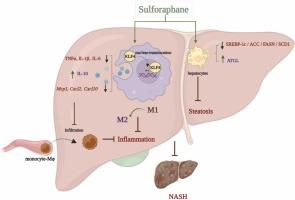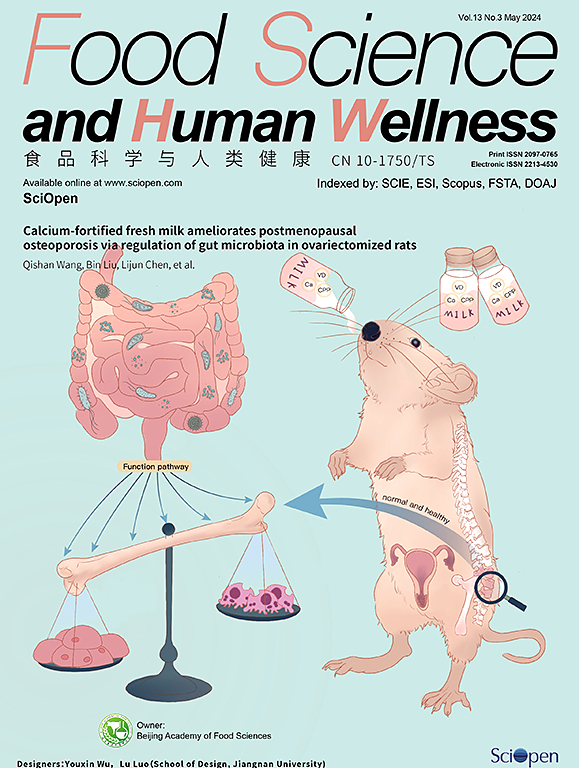绿藻素通过 KLF4 介导的巨噬细胞 M2 极化改善非酒精性脂肪性肝炎
IF 7.4
1区 农林科学
Q1 FOOD SCIENCE & TECHNOLOGY
引用次数: 0
摘要
非酒精性脂肪肝(NAFLD)已成为一个全球性问题,对公众健康构成严重威胁。然而,迄今为止,尚未开发出任何获得批准的治疗药物。利用天然产品进行膳食干预已显示出预防和治疗非酒精性脂肪肝的前景。红豆杉(SFN)是一种具有抗氧化和抗炎特性的植物化合物,以往的研究表明,红豆杉可改善肝脏脂质积累和炎症。然而,这些有益作用的分子机制仍不清楚。在本研究中,我们证实了 SFN 对高脂肪、高果糖饮食诱导的非酒精性脂肪性肝炎(NASH)小鼠模型中过度脂质积累和炎症损伤的保护作用。我们发现,SFN 可减轻巨噬细胞系和 NASH 小鼠肝脏的炎症损伤,这是由于它促进了 M1 型巨噬细胞向 M2 型极化,并调节了炎症介质。进一步的分析表明,SFN诱导的巨噬细胞M2型极化是以Krüppel样因子4(KLF4)依赖的方式发生的。总之,我们揭示了 SFN 活性的新作用机制,并提供了用 SFN 进行膳食干预可预防 NASH 的证据。本文章由计算机程序翻译,如有差异,请以英文原文为准。

Sulforaphane ameliorates non-alcoholic steatohepatitis by KLF4-mediated macrophage M2 polarization
Non-alcoholic fatty liver disease (NAFLD) has become a global issue and a severe threat to public health. However, to date, no approved therapeutic drugs have been developed. Dietary interventions with natural products have shown promise in preventing and treating NAFLD. Sulforaphane (SFN) is a phytocompound with antioxidant and anti-inflammatory properties, and previous research has demonstrated that SFN can ameliorate hepatic lipid accumulation and inflammation. However, the molecular mechanisms underlying these beneficial effects remain unclear. In this study, we confirmed the protective effects of SFN on excessive lipid accumulation and inflammatory injury in a high-fat, high-fructose diet-induced non-alcoholic steatohepatitis (NASH) mouse model. We found that SFN attenuates the inflammatory injury in a macrophage cell line and the liver of NASH mice, owing to the promotion of M1-type macrophage polarization toward the M2-type and the regulation of inflammatory mediators. Further analysis demonstrated that this SFN-induced macrophage M2-type polarization occurs in a Krüppel-like factor 4 (KLF4)-dependent manner. In summary, we uncovered a new mechanism of action underlying SFN activity and provide evidence that dietary intervention with SFN might be protective against NASH.
求助全文
通过发布文献求助,成功后即可免费获取论文全文。
去求助
来源期刊

Food Science and Human Wellness
Agricultural and Biological Sciences-Food Science
CiteScore
8.30
自引率
5.70%
发文量
80
审稿时长
28 days
期刊介绍:
Food Science and Human Wellness is an international peer-reviewed journal that provides a forum for the dissemination of the latest scientific results in food science, nutriology, immunology and cross-field research. Articles must present information that is novel, has high impact and interest, and is of high scientific quality. By their effort, it has been developed to promote the public awareness on diet, advocate healthy diet, reduce the harm caused by unreasonable dietary habit, and directs healthy food development for food industrial producers.
 求助内容:
求助内容: 应助结果提醒方式:
应助结果提醒方式:


